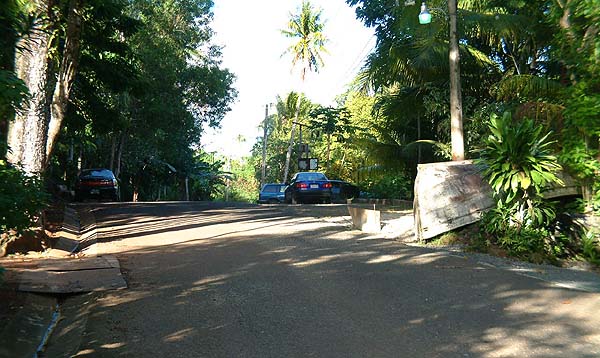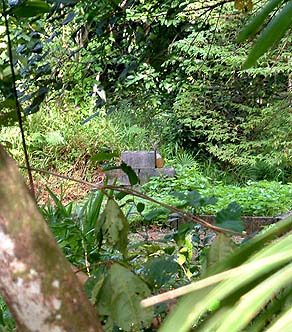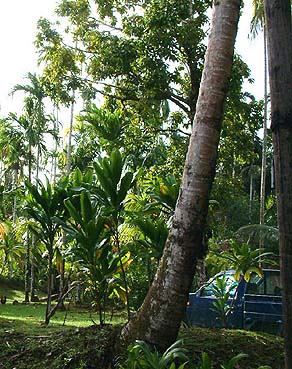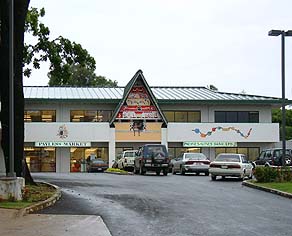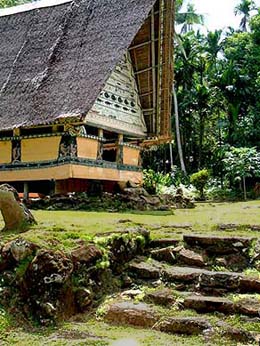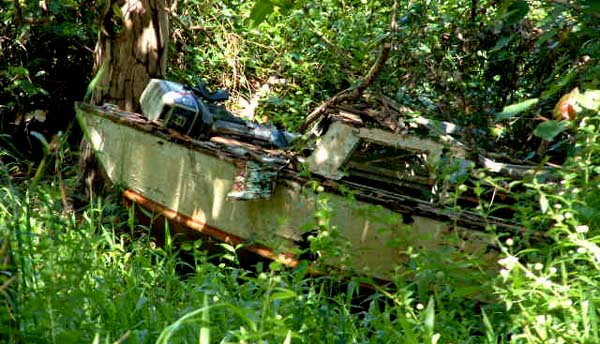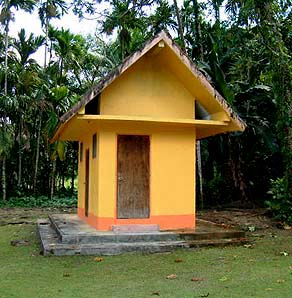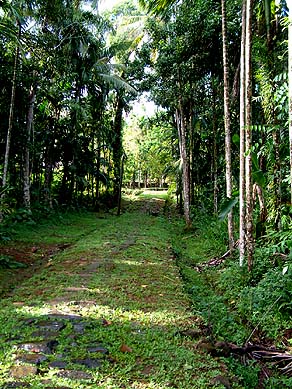 |
 |
 |
 |
||||
|
|
|
|
|
|
|
|
|
|
|
|||||||
|
|
|
|
|
|
“Palau traditionally was divided into small, I will use the term village states,” Johnson explains. “Like the Greek concept of a city-state. In the olden days each village with its Council of Chiefs was for all practical purposes an autonomous political entity. "And now the traditional lines dividing these village -states are being blurred by the more convenient means of transportation, and the centralization of economic activities. These tend to be concentrated in the commercial center, Koror, which is where most of the economic activities take place. Then when you go to the peripheral areas, you find more and more subsistence."
|
||
|
|
||
“Very few people live in the traditional village now,” Walter says, pointing to the overgrown spaces in the village. “Because in my day, there were three more houses on this side, there was one over here and two on this side, two on that side. I think now there are just a few houses here and there.” “The land is still owned by the village, even though we have a governor now. But people don’t live here much anymore. Some built their houses up where the new settlement is, up there on the hill. And they live more of a new type of life than this. But people used to live here, back in the 70s. In those days, when you come over here you see kids, kids running around."
|
|
|
“They moved out, they moved their kids somewhere else. It starts with people going out to Koror and other places looking for jobs, and for school purposes and such. Little by little, they’ll find a lease in Koror, or rent a house, or something like that. “People are used to cars and modern things. They would rather stay in Koror or places where they can have more. It’s very hard. There is an argument among the people here now: Many people here, they want to pave over the stone causeways, so that the cars can come into the village. "People are more into today’s satellite television and cars.They think this is sort of inconvenient here. It is far away from jobs and all the good things they see as necessary for today’s living. So they are moving out to other places."
|
|
|
|
“Now they have government jobs or those kinds of jobs, and the community works aren’t attended to anymore. People have different interests now. Or they go off island to Guam, Saipan, the U.S. mainland, looking for jobs. And they stay there. So the villagers are all over the place now. And when the younger people leave, there is no one here to do the work."
|
||
|
|
||
“The people of the village are still trying to maintain the village so that it doesn’t deteriorate from neglect, like the stones start falling down or dislodging, trees growing on the side of the roads. That’s not how it used to be. It is just shows the lack of hands. But they don’t have enough hands in the village. "From Monday to Friday people are going to Koror or somewhere else to work. We just hope that we have enough money to turn it into something like a park, so we could hire the people to maintain that area. "But right now it is just therubak and maybe the State is helping the village people in the maintenance of the cutting grass and such. That is all they can do now."
|
|
|
“We worked with rubak here about the possibility of charging admission. But that is also very hard to control that. I understand that they were doing it and then they couldn’t really keep up on it. There’s only the rubak. "Some people, they come over here, I guess maybe through the state
or other people who have advised them, and they tried to find their
way around it. Some are willing to pay, but not everyone. We cannot
tell the State to do it, because this is doesn’t belong to them,
this is not the State’s bai"
|
|
|
|
|
“The village is kind of semi-abandoned,” Johnson agrees, “because most people have moved out to the hills where the power and water is. But since I became a chief, every month, each of the top four chiefs, the four corners—we call them the ‘four corner chiefs,’ in Palauan we call it saus, the four saus—have to rotate cleaning the village, all the stone platforms and the bai, every month. So every four months then, it is my turn. And then after you clean the bai you have a meeting and you share stories."
|
||
|
|
||
“My uncle Roman Tmetuchl was Ngiraked before me, and he was a modern, industrialist-philosopher type of chief. He was a go-getter. They met in the bai once every blue moon because they had offices in Koror and it was more convenient to have clerks and all that. “But when I became a chief, even though I am American-educated, I wanted to also emphasis the traditional trappings of leadership by first meeting in our own bai, because that is where my predecessors over the last 200 years have sat. you may say it’s superstitious or what, but a place also makes a difference. Because when you walk to the village it’s semi-deserted as people have moved to the hills."
|
|
|
“But you can walk the stones and count your steps and look at the vegetation and the bai and the storyboards, and you take your seat on the floor where your predecessors have sat for more than 200 years, you realize that you have a traditional role to play. I think we should do our part. And we have students come to the bai sometimes, from elementary school, to be taught our history. “We should conduct our traditional affairs in a ceremonial way, more than just giving it lip service. My father was a religious person, a preacher. And he used to tell us, ‘I’d rather see a sermon than hear one, any day.’ It is better to see an act of goodness than to hear a sermon about the act of goodness. "So being a chief means that you have to perform more than preach. So I am also Palauan, I believe that if you do your part in compliance with tradition, you will increase your odds at succeeding in doing what you are doing."
|
|
|
|
“I’m just sharing my personal views on the role of Airai Village’s chiefs and people. Because we have six hamlets, my next job is to convey a meeting or conference of the all the chiefs, and we talk about things like these and just try to be helpful, and interject into the society the ingredients of cultural heritage. If you are not careful that may be displaced, completely displaced. We can lose our language. We could lose our old legends. We can lose a lot of the invisible, intangible qualities of our heritage.”
|
||
|
|
||
|
|
|
|
|
|

|
| Airai Home | Map Library | Site Map | Pacific Worlds Home |
|
|
|
|

|
|
|
|||
| Copyright 2003 Pacific Worlds & Associates • Usage Policy • Webmaster |
|||
